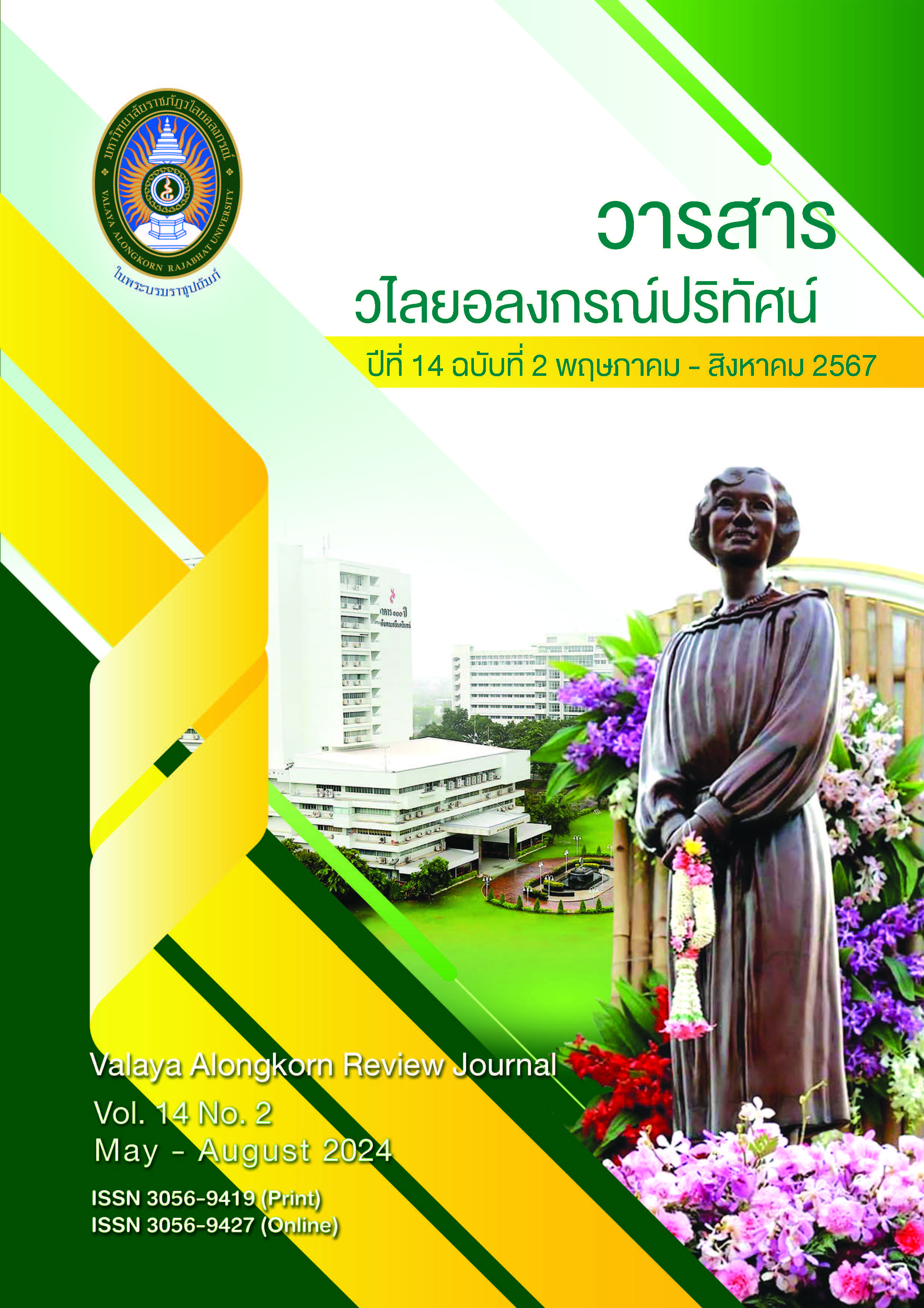EFFECT OF USING PROJECT-BASED LEARNING MANAGEMENT WITH STEM EDUCATION AFFECTING ACADEMIC ACHIEVEMENT AND CREATIVE THINKING OF SCIENCE SUBJECTS OF GRADE 6 STUDENTS
Keywords:
Project-Based Learning, STEM Education, Academic Achievement, Creative ThinkingAbstract
This pre – experimental research design aimed to 1) compare the science achievement of grade 6 students before and after project-based learning combined with STEM education, 2) compare the science achievement of grade 6 students after project-based learning combined with STEM education with the criterion of 70 percent of the full score, and 3) compare the results of the assessment creativity later project-based learning was organized along with STEM education of students in grade 6 with the criterion of 70 percent of full scores. The sample used was grade 6 students of Prasitti Wittaya School who are studying in the semester 1 of academic year 2023, totaling 12 people. The instruments used in this research were 1) Science learning plan which organized project-based learning with STEM education 8 plans in 16 hours which was appropriate at a high level (M = 4.10 – 4.40), 2) Academic achievement test which is a multiple choice test with 4 options totaling 30 questions has a reliability of .92 and 3) a project evaluation form to measure creativity there are four areas of assessment: (1) Fluency (2) Flexibility (3) Originality and (4) Elaboration which is appropriate at the highest level (M = 4.00 - 5.00). Statistics used in data analysis include percentage, mean, standard deviation, t-test for dependent samples and t-test for one sample. The research findings were as follows: 1) science achievement of grade 6 students who received project-based learning combined with STEM education after receiving the learning management academic achievement was higher than before receiving the learning management. Statistically significant at the .05 level (M = 22.33 from a full score of 30, S.D. = 2.06, t = 20.904), 2) science achievement of grade 6 students after project-based learning combined with STEM education was higher than 70 percent of the full score with statistical significance at the level .05 (M = 22.33 from a full score of 30, S.D. = 2.06 and t = 2.242) and 3) the results of the creativity assessment later project-based learning was organized along with STEM education of grade 6 students above the 70 percent threshold of full score with statistical significance at the .05 level (M = 13.08 from a full score of 16, S.D. = 1.62 and t = 4.024).
References
กระทรวงศึกษาธิการ. (2551). หลักสูตรแกนกลางการศึกษาขั้นพื้นฐาน พุทธศักราช 2551. กรุงเทพฯ: โรงพิมพ์ชุมนุมสหกรณ์การเกษตรแห่งประเทศไทย จำกัด.
ทิศนา แขมมณี. (2561). ศาสตร์การสอน. (พิมพ์ครั้งที่ 22). กรุงเทพฯ: โรงพิมพ์แห่งจุฬาลงกรณ์มหาวิทยาลัย.
เทพกัญญา พรหมขัติแก้ว. (2557). ความรู้เบื้องต้นเกี่ยวกับการจัดการเรียนรู้แบบโครงงาน. นิตยสาร สสวท., 42(188): 14-17.
นงลักษณ์ เขียวมณี. (2562). การศึกษาผลสัมฤทธิ์ทางการเรียน กลุ่มสาระการเรียนรู้การงานอาชีพและเทคโนโลยี และความสามารถในการคิดสร้างสรรค์ ของนักเรียนชั้นมัธยมศึกษาปีที่ 3 โดยวิธีการจัดการเรียนรู้แบบใช้โครงงานเป็นฐาน. ปริญญานิพนธ์ครุศาสตรมหาบัณฑิต สาขาวิชาหลักสูตรและการสอน มหาวิทยาลัยราชภัฏวไลยอลงกรณ์ ในพระบรมราชูปถัมภ์ จังหวัดปทุมธานี.
นภสร ยลสุริยัน. (2563). ผลการจัดการเรียนรู้แบบโครงงานเป็นฐานร่วมกับแนวคิดแบบ STEM EDUCATION เพื่อส่งเสริมความเป็นนวัตกรและผลงานสร้างสรรค์ ของนักเรียน
ชั้นประถมศึกษาปีที่ 5. ปริญญานิพนธ์ศึกษาศาสตรมหาบัณฑิต สาขาวิชาหลักสูตรและการสอน มหาวิทยาลัยศิลปากร.
บุญชม ศรีสะอาด. (2545). การวิจัยเบื้องต้น. (พิมพ์ครั้งที่ 7). กรุงเทพฯ: สุวีริยาสาส์น.
พิมพันธ์ เดชะคุปต์ และพเยาว์ ยินดีสุข. (2560). สอนเด็กทำโครงงาน สอนอาจารย์ทำวิจัยปฏิบัติการในชั้นเรียน. (พิมพ์ครั้งที่ 3). กรุงเทพฯ: โรงพิมพ์แห่งจุฬาลงกรณ์มหาวิทยาลัย.
ลือชา ลดาชาติ. (2565). สะเต็มศึกษา นโยบาย ทฤษฎี และการปฏิบัติ. กรุงเทพฯ: จุฬาลงกรณ์มหาวิทยาลัย.
วรรณา สายสว่าง. (2564). ผลการจัดการเรียนรู้สะเต็มศึกษาร่วมกับทักษะปฏิบัติที่มีต่อความสามารถในการแก้ปัญหาทางวิทยาศาสตร์และความสามารถในการให้เหตุผล ทางคณิตศาสตร์ ของนักเรียนชั้นประถมศึกษาปีที่ 6. ปริญญานิพนธ์ครุศาสตรมหาบัณฑิต สาขาวิชาหลักสูตรและการสอน มหาวิทยาลัยราชภัฏวไลยอลงกรณ์ ในพระบรมราชูปถัมภ์ จังหวัดปทุมธานี.
วิจารณ์ พานิช. (2555). วิถีสร้างการเรียนรู้เพื่อศิษย์ในศตวรรษที่ 21. กรุงเทพฯ: ตถาตา พับลิเคชั่น จำกัด. [ออนไลน์], เข้าถึงได้จาก: http://thesis.swu.ac.th/swuebook/h407867.pdf
สถาบันส่งเสริมการสอนวิทยาศาสตร์และเทคโนโลยี. (2557). ความรู้เบื้องต้นสะเต็ม. [ออนไลน์], เข้าถึงได้จาก: https://www.scimath.org/ebook-stem/item/13056-2023-06-15-02-13-03
สภานิติบัญญัติแห่งชาติ. (2558). รายงานข้อเสนอเชิงนโยบายสะเต็มศึกษา (STEM Education) นโยบายเชิงรุกเพื่อพัฒนาเยาวชน และกําลังคนด้านวิทยาศาสตร์ เทคโนโลยี วิศวกรรมศาสตร์ และคณิตศาสตร์. กรุงเทพฯ: สำนักการพิมพ์สำนักงานเลขาธิการวุฒิสภา.
สุพรรณี ชาญประเสริฐ. (2556). การจัดการเรียนรู้วิทยาศาสตร์และทักษะที่จำเป็นในศตวรรษที่ 21. นิตยสาร สสวท., 42(185): 10-13.
สำนักงานคณะกรรมการการศึกษาขั้นพื้นฐาน กระทรวงศึกษาธิการ. (2564). ก้าวแรก การจัดการเรียนรู้โดยใช้โครงงานเป็นฐาน (Project-Based Learning: PBL). กรุงเทพฯ: ห้างหุ้นส่วนจำกัด เอ็น.เอ.รัตนะเทรดดิ้ง.
สำนักงานเลขาธิการสภาการศึกษา กระทรวงศึกษาธิการ. (2550). การจัดการเรียนรู้แบบโครงงาน. กรุงเทพฯ: โรงพิมพ์ชุมนุมสหกรณ์การเกษตรแห่งประเทศไทย จำกัด.
สำนักงานศึกษาธิการจังหวัดอ่างทอง. (2565). รายงานผลการทดสอบทางการศึกษาระดับชาติขั้นพื้นฐาน (O-NET) ปีการศึกษา 2564 ระดับชั้นประถมศึกษาปีที่ 6. https://bit.ly/report-o-net-2564
อาทิตยา พูนเรือง. (2559). การพัฒนาผลสัมฤทธิ์ทางการเรียนและความสามารถในการแก้ปัญหาทางวิทยาศาสตร์ เรื่อง เอนไซม์ โดยใช้การจัดการเรียนรู้ตามแนวทางสะเต็มศึกษา.ปริญญานิพนธ์การศึกษามหาบัณฑิต สาขาวิชาชีววิทยา คณะวิทยาศาสตร์ มหาวิทยาลัยศรีนครินทรวิโรฒ.
Diana, L. R. (2012). Integrated STEM Education through Project-Based Learning. [Online], Available: https://issuu.com/dlaboyrush/docs/integrating_stem_ through_project_ based_learning.
Nancy, B. H. (2007). Transporting Pedagogy: Implementing the Project approach in Two First-Gread Classroom. Journal of Advanced Academics. 18(4): 530-564.
Scott, C. (2012). An Investigation of Science, Technology, Engineering and Mathematics (STEM) Focused High School in the U.S. Journal of STEM Education. 13(5): 30-39.
Downloads
Published
How to Cite
Issue
Section
License
Copyright (c) 2024 สำรวย ลายตลับ, เมษา นวลศรี, สุวรรณา จุ้ยทอง

This work is licensed under a Creative Commons Attribution-NonCommercial-NoDerivatives 4.0 International License.
ข้อความที่ปรากฏในบทความแต่ละเรื่องในวารสารวไลยอลงกรณ์ปริทัศน์ เป็นความคิดเห็นของผู้นิพนธ์แต่ละท่าน มิใช่เป็นทัศนะและมิใช่ความรับผิดชอบของกองบรรณาธิการจัดทำวารสาร และ
มหาวิทยาลัยราชภัฏวไลยอลงกรณ์ ในพระบรมราชูปถัมภ์


